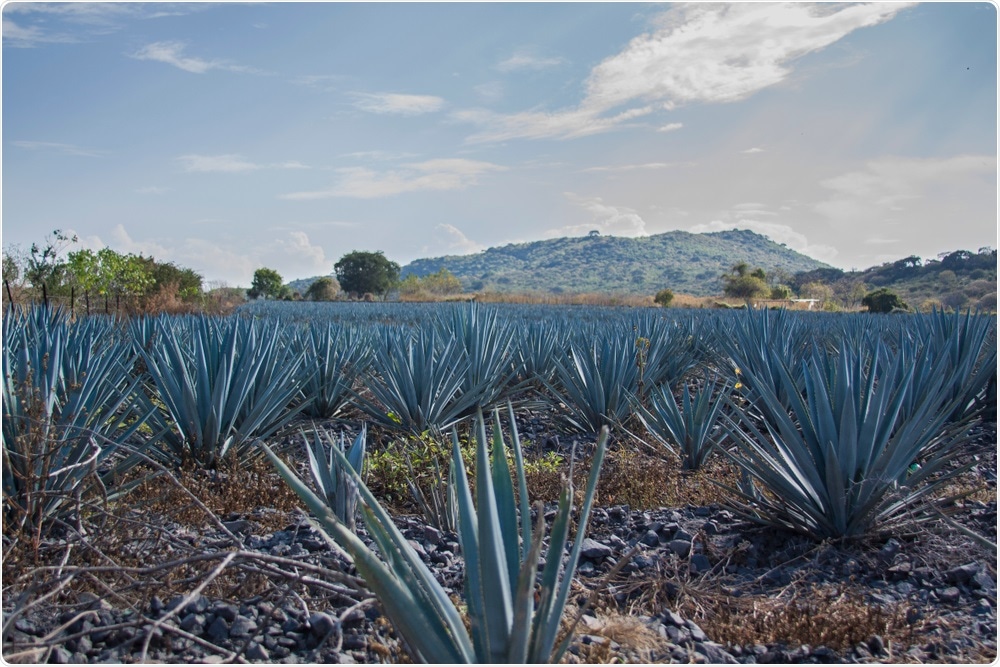The agave plant used to make tequila could be established in semi-arid Australia as an environmentally friendly solution to Australia's transport fuel shortage, a team of researchers at the University of Sydney, University of Exeter and University of Adelaide has found.

Image Credit:Alejandro Chalini Ochoa/Shutterstock.com
The efficient, low-water process could also help produce ethanol for hand sanitizer, which is in high demand during the COVID-19 pandemic.
In an article published this week in the Journal of Cleaner Production, University of Sydney agronomist Associate Professor Daniel Tan with international and Australian colleagues have analyzed the potential to produce bioethanol (biofuel) from the agave plant, a high-sugar succulent widely grown in Mexico to make the alcoholic drink tequila.
The agave plant is now being grown as a biofuel source on the Atherton Tablelands in Far North Queensland by MSF Sugar, and it promises some significant advantages over existing sources of bioethanol such as sugarcane and corn, Associate Professor Tan said.
Agave is an environmentally friendly crop that we can grow to produce ethanol-based fuels and healthcare products. It can grow in semi-arid areas without irrigation, and it does not compete with food crops or put demands on limited water and fertilizer supplies. Agave is heat and drought tolerant and can survive Australia's hot summers."
Associate Professor Tan, Sydney Institute of Agriculture.
Associate Professor Tan assembled the research team and led its economic analysis.
Lead author Dr Xiaoyu Yan from the University of Exeter, who led the lifecycle assessment, said: "Our analysis highlights the possibilities for bioethanol production from agave grown in semi-arid Australia, causing minimum pressure on food production and water resources.
"The results suggest that bioethanol derived from agave is superior to that from corn and sugarcane in terms of water consumption and quality, greenhouse gas emissions, as well as ethanol output."
This study used chemical analyses of agave from a pilot agave farm in Kalamia Estate, Queensland (near Ayr) undertaken by Dr. Kendall Corbin for her University of Adelaide Ph.D., supervised by Professor Rachel Burton.
"It is fabulous that the results of my chemical analysis can be used in both an economic and environmental footprint study and have real-world applications", Dr. Corbin said.
"The economic analysis suggests that the first generation of bioethanol production from agave is currently not commercially viable without government support, given the recent collapse in the world oil price," Associate Professor Tan said. "However, this may change with the emerging demand for new ethanol-based healthcare products, such as hand sanitizers."
This is the first comprehensive lifecycle assessment and economic analysis of bioethanol produced from a five-year agave field experiment in north Queensland. Our analysis shows a bioethanol yield of 7414 liters a hectare each year is achievable with five-year-old agave plants."
The study found that sugarcane yields 9900 liters a hectare each year. However, agave outperforms sugarcane on a range of measures, including freshwater eutrophication, marine ecotoxicity and - crucially - water consumption.
Agave uses 69 percent less water than sugarcane and 46 percent less water than corn for the same yield. For US corn ethanol, the yield was lower than agave, at 3800 liters a hectare a year.
"This shows agave is an economic and environmental winner for biofuel production in the years to come," Associate Professor Tan said.